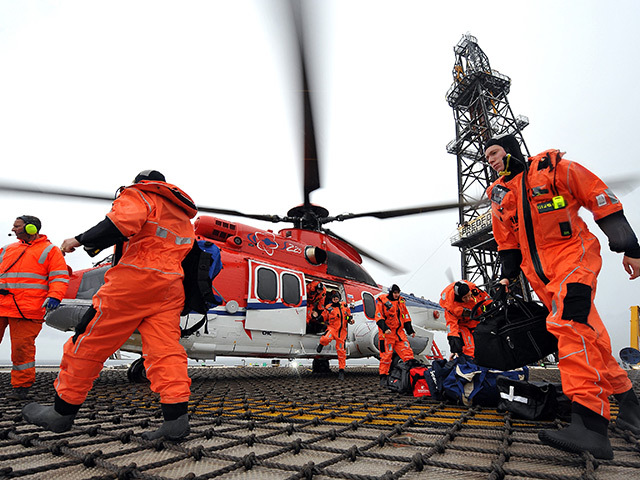
A new campaign aimed at improving North Sea helicopter safety is officially being launched in Aberdeen today.
Trade union Unite has called for industry body Oil and Gas UK to implement a raft of improvements following a survey which showed more than three-quarters of offshore workers are not confident in the safety of aircraft.
A total of 81% of 532 people questioned said their level of confidence in helicopter flight had decreased in the last 12 months.
The survey was carried out after the Super Puma crash off Shetland in August which left four people dead. There have been four other helicopter accidents in the North Sea since 2009.
The Back Home Safe campaign is calling for increased investment to create a larger offshore fleet – a call backed by 95% of workers.
The survey showed 89% of workers wanted internal emergency lighting fitted to helicopters.
Watch our interview with Unite about the campaign launch below
Unite has urged Oil and Gas UK to provide safer emergency lighting and seating configuration in helicopters and to implement all the safety recommendations from past incidents.
The union is calling for an independent review to improve contingencies in the event of a ditching, to maximise the survival time for workers, and for improved survival equipment and training for workers.
Unite regional officer Tommy Campbell said: “Offshore workers have spoken and clearly stated their legitimate concerns.
“Over 1,500 offshore workers have already backed Unite’s demands and we expect many more to pledge their support before the petition is submitted to Oil and Gas UK in December.
“Overwhelmingly offshore workers are demanding action from the industry to improve the safety of offshore helicopter flight. Oil and Gas UK must now act.”
Oil & Gas UK last night acknowledged the concerns raised by Unite and said they were taking them very seriously.
A spokesman said: “Oil & Gas UK is working closely with Step Change in Safety, who is aware of similar concerns raised by the workforce, with the helicopter operators to review the emergency lighting inside the passenger cabin and with Eurocopter to review the seating configuration of the EC225.
Robert Paterson, Oil & Gas health and safety director, said “Helideck lighting was raised as an issue after an incident involving a helicopter in February 2009.
“The CAA issued further guidance for improvements to the helideck circle that should also be made and industry trials are near completion”.
The European Aviation Safety Agency is currently reviewing helicopter flotation arrangements including whether it can be configured to enable a helicopter to float on its side, following a controlled landing on water.
Energy Minister Fergus Ewing said Holyrood was ready to assist the review into helicopter safety.
“The safety of offshore workers is paramount and this government will do all it can to help deliver more robust review processes,” he said.
“That is why we welcomed the review into North Sea offshore helicopter operations which was announced by the Civil Aviation Authority (CAA) on September 24 and we continue to work closely with all interested parties to ensure that the incident is fully investigated and that lessons are learned which enhance the safety of the offshore sector.
“The CAA will work with the Norwegian CAA and the European Aviation Safety Agency to draw up a report, which it expects to publish early next year. The Scottish Government welcomes this review and looks forward to assisting on the advisory panel as the review progresses.”
North-east Labour MSP Richard Baker said: “Unite have identified serious issues that must be addressed as a matter of urgency to restore the confidence of the workforce.”
Aberdeenshire South and Kincardine North SNP MSP Maureen Watt said: “The concerns expressed by the workers are entirely legitimate.”
Les Linklater, of Step Change in Safety, said he was aware of the campaign and the organisation’s goal was to make sure that the UK’s oil industry was the safest place to work.
